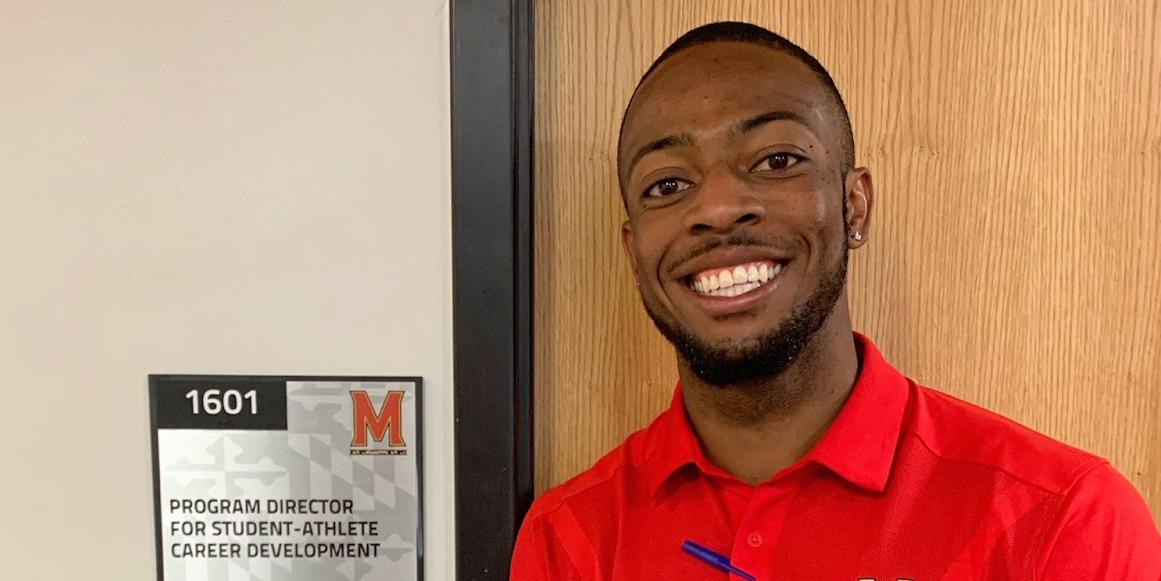
The year 2020 will forever be remembered as a monumental period in world history. From mask mandates and curfews to the postponement of the 2020 Tokyo Summer Olympics, the ongoing global pandemic forced us to pause and make decisions based on our rapidly changing circumstances rather than relying on what had been done in the past. While we were still processing and learning from our 2020 experience, the world moved into a new calendar year. In May 2021, I experienced the most pivotal learning moment in my educational career.
May 13, 2021.
I’ll never forget the day. I was walking out of the Xfinity Center to my car when I ran into a student-athlete. I asked about how she was doing and her internship plans for the summer. I also inquired why she chose not to apply for an executive board position on Pre-Health Terps, Maryland’s student-athlete organization dedicated to helping college athletes pursue careers in the health professions. She giggled and confessed, “I did not know if I could apply.”
Her name is Bibi Donraadt.
Bibi is an international student-athlete, double majoring in Biology and Psychology on the Pre-Med track. She also participates in the Barry and Mary Gossett Fellows program, a career and leadership initiative that prepares student-athletes to pursue their evolving career goals. In her spare time, Bibi competes on the UMD Field Hockey team, where she has earned several awards, including 2021 NFHCA All-Mid Atlantic Region First Team, 2020 Big-Ten All Second Team, and 2018 Big Ten Freshman of the Year. Despite her academic discipline, career interests, and leadership experience she chose not to apply because she thought the leadership positions were only for U.S. student-athletes.
Perfect timing.
At the University of Maryland, I serve dual roles. I am the program director for student-athlete career development, and I am also a Ph.D. student in the Student Affairs concentration in the College of Education. Since starting the program, I’ve been encouraged by faculty and peers to challenge my assumptions and embrace the process of unlearning knowledge and practices I thought were applicable to all college athletes. More specifically, there were two classes I completed during the Winter 2021 and Spring 2021 terms that introduced me to new concepts, vocabulary, and theories that would guide my real-world practice. These classes were Dr. Goodman’s HESI 789A: College Student Governance and Involvement and Dr. Woodman’s EDHI 788T International Education and Cultural Exchange course.
Dr. Goodman’s course introduced me to the Learning Partnerships Model (LPM), a framework that prioritizes co-construction with students, centers student identity in the learning process, and empowers students to take ownership of their learning. Dr. Woodman’s course invited me to learn more about Universitas 21 (U21) (an international network of 27 universities of which UMD is a member), develop my international education philosophy, and reimagine how U.S. college athletes can become influential actors in comprehensive internationalization. Not only did these courses give me the background I needed to respond to Bibi’s comment and support her growth, but they also gave me confidence in my ability to internationalize Maryland Made’s curriculum and programming to more broadly support student’s desires to learn and lead.
Alongside Bibi, Christine Laurie and Mackenzie Morgan, that’s exactly what WE did.
First, we created a new position, Student Director of International Affairs within the Maryland Made athlete development program. This position serves on both our Student Athlete-Advisory Committee (SAAC) executive board as well as on Pre-Health Terps. Next, we relaunched Worldwide Terps, a Maryland international student-athlete (ISA) organization whose mission is to assist ISAs in their ongoing adjustment to U.S. higher education, while also equipping students with the knowledge and experiences to transition into the global workforce. Last but not least, we asked the Office of International Affairs (OIA) to connect us with our U21 partner, McMaster University in Canada so that we could plan our first program across geographic boundaries.
On Wednesday, October 27, 2021, the Maryland Made student-athlete development program hosted a virtual information session for U21 partner McMaster University! Co-sponsored by Worldwide Terps and Pre-Health Terps, McMaster’s School of Rehabilitation Science shared more about their MSc. in Physiotherapy program, including pertinent information about credit transfer, experiential learning, and the interview process.The session was open to all students, faculty, staff, and coaches, though the primary focus was for Canadian student-athletes interested in returning home for graduate education. Altogether, there were 29 participants on the call representing a dozen universities across both the United States and Canada.
Program attendance and offline feedback help inform Maryland Made’s next step: to challenge U.S. definitions of career development and workforce preparation. Through conversations with talent acquisition staff members and graduate programs, we came to realize that networking is valued differently in other countries. Academic credits from U.S. degree programs do not always transfer to non-U.S. graduate school application processes and definitions of career readiness and employability competencies vary depending on cultural contexts. As U.S. institutions continue to attract international students and college coaches recruit international athletes, I am left with the following question.
How can we account for the experiences of international students in the career development curriculum?
My colleague Randall Phyall (LTSC) often emphasizes the importance of justice centered advising for all college students. International student-athletes are not the exception.
Justice centered advising for international student-athletes is rooted in learning partnerships, internationalizing curriculum, and mutually-beneficial global partnerships. Our program with McMaster University was the first step. But we aren’t done yet.
Thank you Dr. Goodman, Dr. Woodman, and the Office of International Affairs for your support of Maryland athletics! Bibi, Christine, and Mackenzie - Let’s keep having fun. There is important work for us to do and to be done.
It's personal.
